Kwantlen University by the numbers: A calculated look at our school’s student demographics
January 14, 2010 by Mitch Thompson · Leave a Comment
By Jacob Zinn & Mitch Thompson
To better understand how the generational groups at Kwantlen work, the Chronicle polled a sample of students from three campuses: Surrey, Richmond and Langley.
The students were asked what year they were born, how many computers they own, if they have a Facebook page and whether or not they agreed with the generational values usually associated with people their age.
They were then given a five-point history quiz in which major events were named. Students had to give a basic description of 9/11, the Challenger shuttle disaster, JFK’s assassination, knowledge of the Berlin Wall and the bombing of Pearl Harbour.
The following graphs are the compiled results.
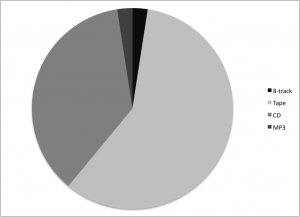
First music format purchase - Generation Y
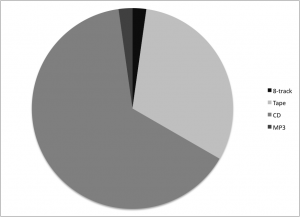
First music format purchase - Generation Z
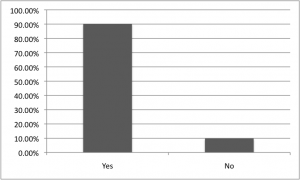
Facebook page - Generation Y
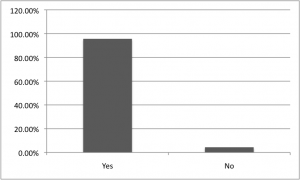
Facebook page - Generation Z
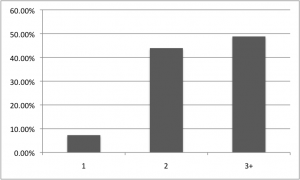
Number of computers owned - Generation Y
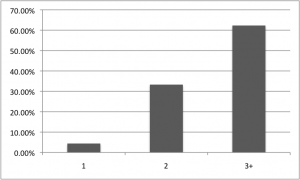
Number of computers owned - Generation Z
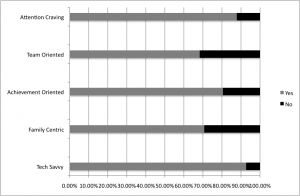
Agreement with generational characteristics - Generation Y
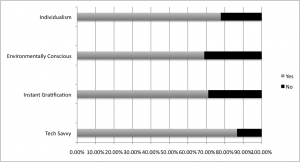
Agreement with generational characteristics - Generation Z

Percentage of correct answers to historical quiz - Generation Y

Percentage of correct answers to historical quiz - Generation Z
Students are learning more, but in danger of info overload
January 14, 2010 by Mitch Thompson · Leave a Comment

The overall population breakdown of Kwantlen Polytechnic University, based on age.
Almost half of Kwantlen students are members of Generations Y and Z, according to figures from the Institutional Analysis and Planning department, and were born into a world of personal computers and an explosion of information.
Generation Y includes people born between 1980 and 1989; Generation Z is those born in 1990 and subsequent years. Student records show that 48.8 per cent of Kwantlen students were born between 1988 and 1992.
The Y and Z designations came from a need for a distinction between the Baby Boomers, who were born after World War Two, and their children, who were born between 1965 and 1980. Those children have been called the “after-boomers.â€
Canadian author Douglas Coupland coined the phrase Generation X in his 1991 novel Generation X: Tales for an Accelerated Culture. He believed the title signified the seemingly contradictory ways of post baby-boom society.
The name caught on,and the Y and Z labels followed.
According to an article on About. com, a New York Times-run website, Gen-Yers value family time and teamwork. Generation Z, however, is more individualistic and puts less stock in family values, according to an article in Australia’s Herald Sun.
But there is one overarching value that the generations share.
“The main value, given their age, is probably a thirst for knowledge and looking for means of meaningful self-expression,†said Peter Clayton, a Kwantlen instructor whose courses focus on media and sociology.
This need to know manifests itself in the widespread use of the Internet to discover information and communicate ideas to others.
“The more serious-minded of them spend an enormous amount of time online in the quest for knowledge,†said Clayton.
The older ways of researching, using libraries and books, are slowly being phased out in favour of websites such as Wikipedia or Google.
It’s a change that allows them to learn while delivering the content in a way that is culturally relevant to them, explained Clayton.
However, this cultural inclination towards technology has created never-before-seen consequences for those of Generations Y and Z.
“The downside of all the information technology is that, as far as
leisure time is concerned, people spend more time on their own,†said Clayton.
Generations Y and Z are characterized by physical isolation.
Though they may be talking to friends online, they are still alone at a computer, which can have a negative effect on how they socialize in public.
“On one hand [their culture] encourages them to be more outward-looking,†said Clayton. “But on the other hand, it encourages them to be more isolated and inward-looking.â€
As well, constant access to the Internet has created two generations that suffer from information overload, Clayton said.
“They are probably a lot more stressed out than they realize,†he said. The two generations have become walking dichotomies, Clayton believes, as they want to learn as much as possible, but suffer from extreme information overload.
Lucky ones win chance to buy Olympic tickets today
December 14, 2009 by Kirk Darbyshire · 1 Comment

(Left to right) Maggie Fung, executive director of IET, Desiree Yu, public information assistant of marketing and communication, Linda Gomes, executive assistant of finance and administration, oversee Monday's Olympic ticket draw on Surrey campus. (Kirk Darbyshire photo)
If you are a student or employee of Kwantlen, and Monday is your lucky day, you may have gotten a chance to buy tickets to the 2010 Olympic Games.
A total of 1,118 students and 264 employees entered their names in the draw for tickets to the 57 events available to Kwantlen for the upcoming winter games, according to Peter Chevrier, director of marketing and communications for Kwantlen.
People who won the right to purchase tickets were being notified by e-mail late in the day Monday and will have seven days to decide whether to purchase the offered tickets or not.
If the first person passes on the tickets, then they will be offered to a second person, selected by the random number generating computer software, and so on until all tickets are purchased.
Hockey was the most requested event in the draw, with 844 people requesting tickets to the men’s gold medal game. The least requested event was figure skating with only 333 people putting their names forward for tickets the men’s short program.
The draw, which took place on Kwantlen’s Surrey campus, was witness by two people who weren’t participating in the ticket lottery, to ensure accuracy and fairness.
Video: Kwantlen at belt level
December 2, 2009 by Mitch Thompson · Leave a Comment
Emily Brook is a Kwantlen student who, due to a lifelong disability, relies on a wheelchair for mobility. Here she discusses her disability, as well as the issues of being wheelchair-bound, a state she did not choose but which defines how others see her.
Students exchange culture and classrooms
November 26, 2009 by Kirk Darbyshire · Leave a Comment
If you have always wanted to study abroad but didn’t want to pay international student rates, then Kwantlen is for you this week.
On the heels of International Education Week, Kwantlen is hosting information sessions for students who wish to apply to spend a semester studying at selected schools around the world.
Journalism is one program that has been involved in student exchanges in the past.
“All the journalism students who have gone on our European exchanges have pretty much had life-changing experiences,†said Beverley Sinclair, journalism program coordinator at Kwantlen. “Apart from the journalism education they get abroad, they get the experience of living in a different culture, surrounded by the history and beauty of Europe.â€
Kwantlen is currently accepting applications for exchanges during the 2010/11 academic year. Students who wish to apply must meet certain requirements to be considered for the exchange program. Applicants must have a minimum 2.67 GPA and have completed at least 30 university credits, 15 of which must have been done at Kwantlen. As well, once finished the exchange students must then return to Kwantlen and complete a minimum of nine more credits in the following semester.
Along with academic requuirements, students are also responsible to cover their own costs of travel and living while on exchange. The one major advantage is that students will only have to pay tuition to Kwantlen, at the same rates they would pay if attending school in the Lower Mainland, and not the much higher international student fees traditionally charged visiting students.
Students are often encouraged to do the exchange during the spring term, because European school semesters do not match up with Canadian ones. If a student went abroad in the fall semester of 2010, their European exchange wouldn’t end until four weeks into Kwantlen’s spring term. Also, if students spend the spring semester studying, it frees them up to travel around Europe for the summer before they have to return to Kwantlen for classes in the fall.
Students who would like more information but who were unable to attend or missed the information sessions this week, can do so by contacting international programs and exchanges through e-mail at Internationalprograms@kwantlen.ca or by phone at 604-599-2255.
Students, staff can turn luck – and money – into Olympic tickets
November 18, 2009 by Kirk Darbyshire · Leave a Comment
Kwantlen students and staff can win the chance to purchase tickets to the 2010 Olympic Winter Games.
As a community contributor partner with VANOC, one of the opportunities available to the university is the chance to purchase tickets for a variety of events at the 2010 Games. Kwantlen has decided to pass that perk along to students and employees by way of a random draw. The draw is open to anyone who is an employee or is attending Kwantlen as a student during the 2009-’10 academic year.
“We (Kwantlen) have made 176 of 178 tickets available for the draw,†said Peter Chevrier, director of marketing for the university. The two tickets not being made available, which are for a preliminary men’s ice hockey game, were donated to a raffle to support the United Way campaign.
Anyone interested in winning the chance to buy tickets can make their request through the Kwantlen 2010 Olympic Games ticket request website, which is now online.
All tickets will be sold at face value and are available at a wide range of prices for a wide range of events. Events include everything from $1,100 opening ceremony tickets to $50 men’s freestyle skiing aerials qualifying event tickets. Tickets are even up for grabs for the men’s ice hockey gold medal game, if you can afford the $775-a-ticket price.
The final draw and notification of those who have been chosen for tickets will be done on Monday, Dec, 14. According to Chevrier, the luckier you are the more tickets you will have the chance of buying as there is no limit on the number of events one person’s entry can be selected for.
Once notified, people will have seven days to decide whether they want to buy the tickets. Tickets that are not purchased will be made available to others through a re-drawing.
Kwantlen counts heads, expects record enrolment
October 6, 2009 by Sarah Jackson · Leave a Comment
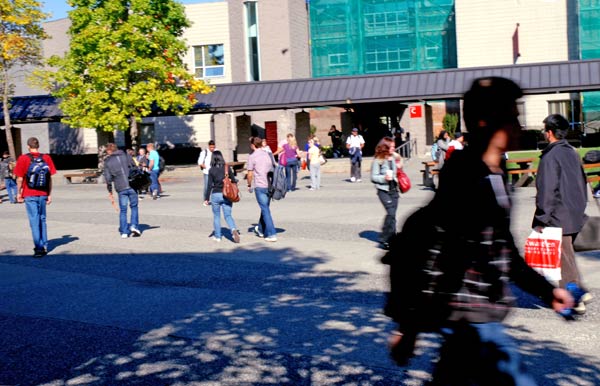
Students bustle between classes at Kwantlen's Surrey campus, which is busier this year because of an over 10 per cent increase in student enrolment in the institution's university studies. (Sarah Jackson photo)
Kwantlen Polytechnic University’s classes are more crowded this year than ever before, according to a Kwantlen press release.
The 28-year-old institution’s previous record of 17,000 students is about to be shattered, with 14,677 students enroled in courses beginning on or before Sept. 18. Trades programs starting in October, November and December are expected to put the number of students well over the previous record.
Enrolment in university studies, which do not include qualifying studies, trades or technology programs, is 10 per cent higher than last year. All program areas have seen an enrolment increase of five to 10 per cent. There are 11 per cent more course enrolments from students new to Kwantlen than there were last year. The largest growth is in the arts and business programs.
The press release attributed the growth to Kwantlen’s new university status, a new Bachelor of Arts with a Major in English and Bachelor of Science in Integrated Pest Management programs, and changes to the registration system.
Ron Maggiore, Kwantlen’s executive director of strategic enrolment management, said university status creates “greater interest, more applications and more excitement. University status adds value to a Kwantlen diploma or degree without question.â€
The increase could only mean good things, he said. More students produces more revenue for the school, and “more tuition allows for the creativity to do more things.â€
Maggiore said he isn’t surprised by the enrolment increase, referring to a relationship between post-secondary education attendance and the economy. When the economy is strong, enrolment tends to drop; when it sours, enrolment climbs.
The enrolment increase is not limited to Kwantlen, though the institution has the highest recorded enrolment increase of all schools in B.C.
A recent announcement from Simon Fraser Institute declared a record enrolment of 28,275 students this year, a seven per cent increase from last year.
Most of SFU’s increase is in international students, up 33 per cent from last year, transfer students and a doubling of students in faculty of health and environment.
“There seems to be a trend and increase of post-secondary students,†said Mehran Kiai, SFU’s director of enrolment services. “It’s too early to say if it’s because of the economy or other reasons.â€
Kiai believes an improved admissions process and growing reputation are contributing factors to the record enrolment.
Craig MacBride, public affairs officer for the B.C. Ministry of Advanced Education and Labour Market Development, was unable to confirm whether there is a trend in post-secondary education enrolment increases but suggested that one may become apparent when final data is collected this November.
“Historically, anytime it’s a recession [enrolment] goes up in universities. I suspect there is a trend,†said MacBride.
Province quietly cuts nursing student aid, other programs
September 21, 2009 by Sarah Jackson · 2 Comments
When she considered attending Kwantlen, Merrilee Foster thought about her two kids, six-year-old Karsten and 12-year-old Kayla. She thought about her two jobs. She thought about the burden of paying back student loans. She knew there would be sacrifices – but she knew she had the ability to help people.
The 39-year-old single mom took the plunge and applied for Kwantlen’s home support resident care attendant program.
She chose that program because, four-and-a-half years ago, Foster learned that her mother had cancer and took care of her at home.
“I didn’t have any training, but, of course, it’s your parent and that’s what you do,†she said.
When her mother passed away years later, a doctor took her aside and said what she did was amazing: not many people could emotionally and physically do what she had done. “I thought there’s gotta be more to my life than what I [was] doing. There’s gotta be a positive. So I decided this was the route that I was gonna take.â€
As she made plans to attend Kwantlen, Foster knew student aid “was everything.†She told the financial aid office that she thought she was crazy. But the financial aid staff told her “there’s so much out there you’re eligible for. Just jump in and do it.â€
Foster called a government official in Victoria for help completing an application for a health care bursary. “She walked me through it and reassured me, so I could sleep at night,†recalled Foster.
Weeks later, she received a letter in the mail saying that funding had been eliminated.
The B.C. government eliminated $16 million in student aid this summer. There was no official announcement and word only reached the public on July 22, when a leaked document listed the programs that were to be immediately and quietly cut. They were the Permanent Disabilities Benefits Program, the Debt Reduction in Repayment Program, the B.C. Loan Reduction for Residential Care Aide and Home Support Worker Program, the Health Care Bursary and the Premier’s Excellence Award Program. Funding for the Nurses Education Bursary was reduced.
Ashley Fehr, the KSA’s chairperson and director of academic affairs, said, “It just makes me sick. It’s disgusting.â€
Fehr said 25 per cent of full-time Kwantlen students depend on some form of student aid. Because Kwantlen has a large nursing program, the university will be hit harder by the cuts than most schools. Fehr is already seeing the impact at the KSA office in Surrey, where students are telling her they don’t know when they’ll have time to complete homework because of the need to work. She expects to see more stressed-out students than usual this year because of financial hardship.
The decision to make the cuts, said Fehr, is “short-sighted because education is necessary for economic recovery . . . We’re going to have a lower-educated society.â€
“Any cuts right now are just a wrong, wrong decision.â€
Dr. Claudette Kelly, Kwantlen’s dean of community and health studies, said the cuts are “unconscionable in a time when there’s such a demand for health care workers.â€
Foster, who still has to account for groceries, her mortgage and the usual mom-related expenses, decided she would tighten her belt and manage, because she wants badly enough to do the course. She refuses to worry about finances because “If I start worrying about it now, I’ll be consumed by it.†But she’s worried about the future of B.C. health care.
Foster said B.C. residents will continue to need health care, but there may not be enough workers, or the workers won’t be as qualified.
“I don’t think that’s gonna be the only cut to bursaries and grants.â€
Students bubbling for business practicum idea
March 9, 2009 by Joseph Gloria · Leave a Comment
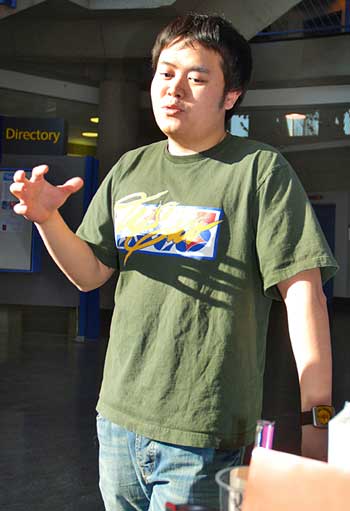
Patrick Wong: "We are trying to put everything that we learned today to try to apply it to a mini-business." (Sandy Buemann photo)
Students at the Richmond campus no longer have to trek to Lansdowne Mall to get their bubble tea fix.
Fourth-year business students Patrick Wong, 23, Seulki Kim and Stephanie Sun, both 25, launched their own bubble tea stand in the rotunda of the Richmond campus in mid-February.
The three-person team was taking part in a project for a practicum class, and planned to run their small business until March 26. “We’ve been through so many years of education,†said Wong. “So, we are trying to put everything that we learned today to try to apply it to a mini-business.â€
Wong, Kim and Sun said that they first had to go through several business launch presentations and get approval from their instructors. “We’ve gone through all the health inspections. The inspector came and looked at the sealing, drinks and the fridge,†said Wong.
The students got ingredients and supplies through connections with a vendor at the Richmond Public Market and were offering several popular flavours of the pre-made and sealed beverage, with prices starting at $4.
While bubble tea cafes have become common throughout the Lower Mainland, the first stores only started showing up in the early 2000s Vancouver. The beverage originated in Taiwan, and is distinguished by large tapioca balls, which are mixed with either hot or cold tea.
“Bubble” refers to the way the tapioca is cooked, since they balloon into chewy balls after being boiled. The tapioca is called “pearls” after the cooking process. The pearls are tasteless and colourless until they are soaked in a brown-sugar-and-water solution. Vendors usually offer two types: milk tea and fruit-flavoured tea.
There are also choices between natural tea and fruits or the sweeter, powder-flavoured slush drinks. Wong and his team are offering powdered taro and original flavours as well as a natural mango flavour.
Traditionally, students in Asia consume bubble tea during breaks and after school as a snack or dessert. Half way around the world, students at the Richmond campus will have the opportunity to do the same.

Cups ready to be filled with bubble tea. (Sandy Buemann photo)
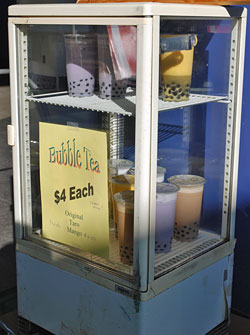
The bubble tea cooler holds drinks ready for students. (Sandy Buemann photo)
Winner wasn’t expecting multiple scholarships
March 9, 2009 by Sandy Buemann · Leave a Comment
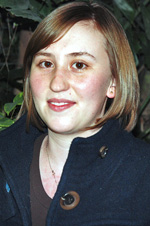
Kristen Lambke
Although she is just celebrating her 23rd birthday next month, Kristen Lambke, Kwantlen student and scholarship winner, has already changed career directions.
Lambke won four scholarships totalling $5,250 at Kwantlen’s 20th Annual Scholarship and Awards ceremony for her work in the Environmental Protection Program.
Lambke applied for Kwantlen scholarships in general but did not expect the awards she won, which included the Doctor Barry Leech memorial scholarship, the Eclipse Environmental Leader scholarship and scholarships from B.C. Hydro and the HSBC Bank of Canada.
She said she was excited and that it was nice to have her hard work at school rewarded.
It may have been scholarships that helped Lambke join the Environmental Protection program in the first place.
Before joining the program, Lambke was a drafter designing industrial buildings, a job, she said, that involved taking care of the needs of the clients in the industry rather than the protecting the environment or using sustainable practices.
“I wanted to have a career where I could, you know, protect the environment rather than destroy it, so I switched over.â€
She had scholarships from the architectural Ddrafting program at the University of the Fraser Valley, something she said pushed her to go back to school.
“It was something just like, okay, I gotta do this.â€
Pam Macdonald, who instructed Lambke in her two first-year introduction to biology classes and a second-year ecology course, said Lambke was a strong but quiet student from the beginning, whose work, from small quizzes to long papers, was nearly perfect.
“I’ve had a lot of good students over the years and I think she is right at the top of those,†said Macdonald.
Although Lambke’s work was consistently good throughout the program, she did improve in other ways.
“I think that she gained a greater sense of self-confidence and recognition of what her potential is over her time here,†said Macdonald.
Macdonald described Lambke as calm, cheerful and modest, qualities, she said, that are shared by Lambke’s boyfriend, Jason Beattie, who Macdonald also instructs.
Lambke and Beattie met at their Langley high school, and began dating shortly after.
Although her disappointed parents weren’t invited to the award ceremony, Beattie, who also won a scholarship, was able to attend with Lambke.
“He was happy for me, a little jealous because he wants to get lots of scholarships, too. He’s a really good student as well, but he’s happy.â€
Lambke is currently in her second work practicum, with the B.C. Ministry of Environment, doing incident inspections and samplings
She said she plans on finishing her degree, something she said Macdonald has pushed her to do, and has applied at UBC and UNBC. She will use the money from the scholarships to pay for tuition.
“I think she’ll go a long way in her education, I hope, and in whatever career she chooses,†said Macdonald.
Lambke said she is not sure if she’s figured out what she wants to do for a career, but
said she would like to incorporate her background of construction and design with her new knowledge of the environment to work towards sustainable building and development.
If Lambke could instantaneously change anything about the environment, she said it would be to change people’s minds about it so they would respect it more.
“It takes a lot to change minds, but it will happen eventually.â€


